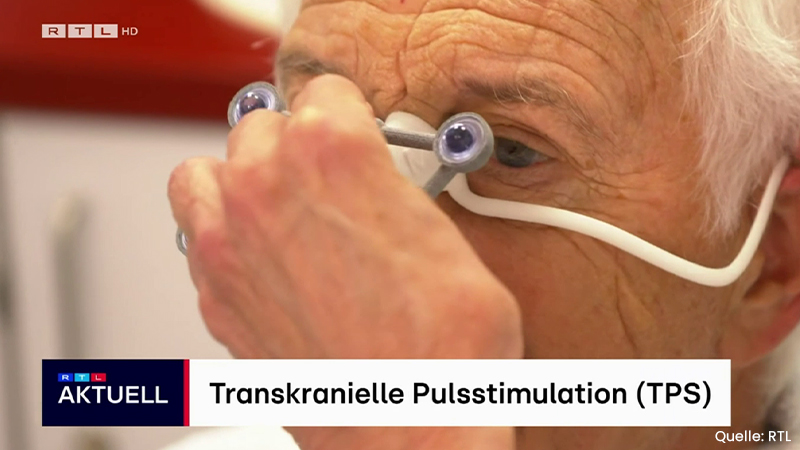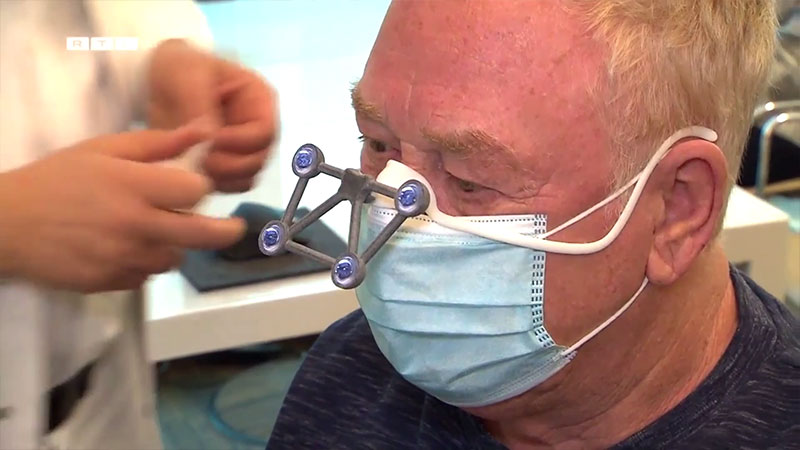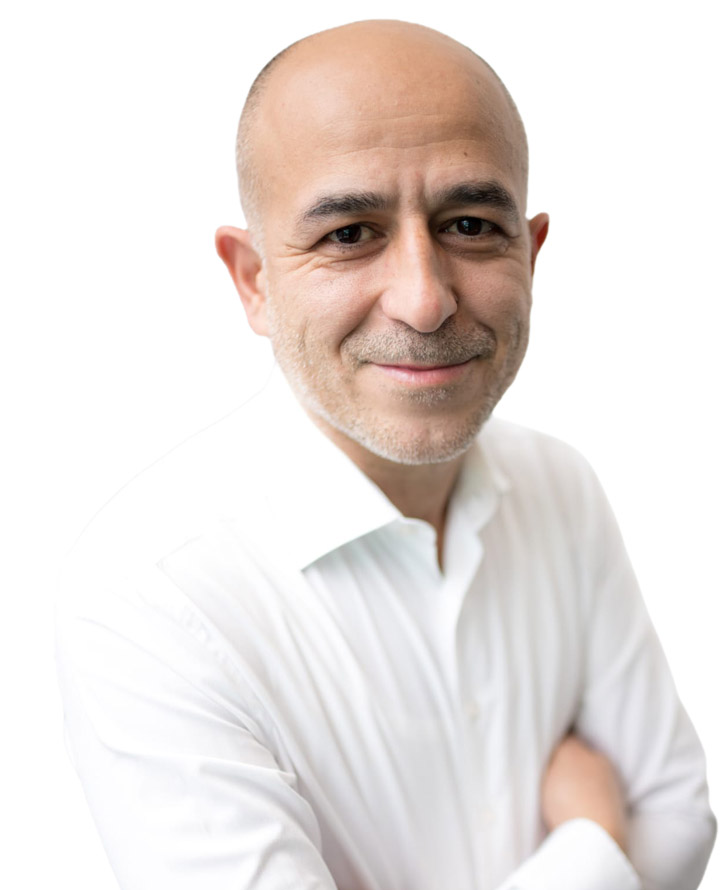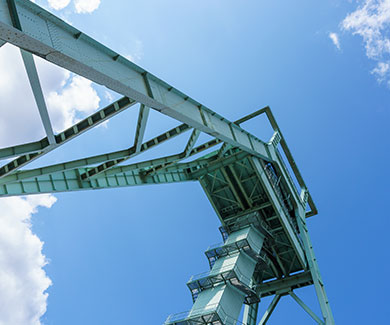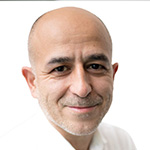TPS-THERAPY
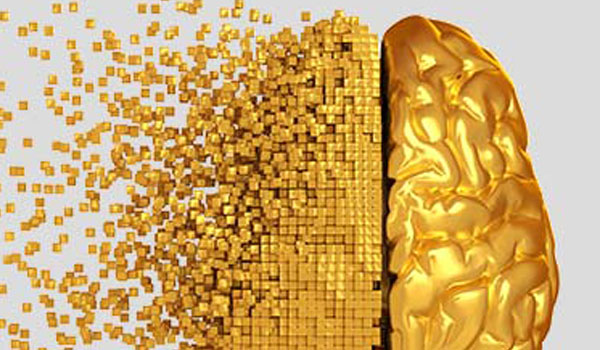
Transcranial Pulse Stimulation - Innovative Procedure
Transcranial Pulse Stimulation is a new, now scientifically well established procedure, which according to studies is recommended for the treatment of mild to moderate Alzheimer’s dementia. This non-invasive shock wave treatment is a method of regenerative medicine that breaks new ground and represents a forward-looking therapeutic option for the non-drug treatment of neuro-degenerative diseases.
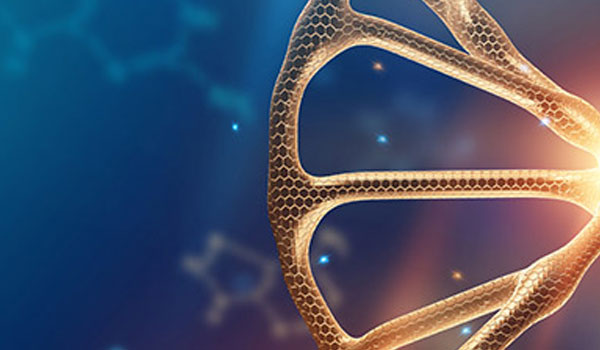
Regenerative medicine with Transcranial Pulse Stimulation
Prof. Dr. med. Musa Citak is one of the leading experts in regenerative medicine in Germany, which also includes the field of neurodegeneration. Due to this specialization, he was among the first physicians from the beginning to both practically apply and scientifically research the therapy option Transcranial Pulse Stimulation for the treatment of Alzheimer’s dementia in several studies.
Shock Wave Therapy - Transcranial Pulse Stimulation (TPS) at RTL
RTL reports again about shock wave therapy TPS
On World Alzheimer’s Day, September 21, 2023, RTL has reported in several formats, including the main news “RTL AKTUELL” , about the shock wave therapy Transcranial Pulse Stimulation (TPS) as one of the most advanced and helpful treatment options for Alzheimer’s dementia.
In this article my colleague Prof. Dr. med. Ullrich Wüllner, director of the Neurocenter of the University Hospital Bonn (UBK) and one of his patients were interviewed. Prof. Wüllner also attests that Transcranial Pulse Stimulation (TPS) is an innovative shock wave method that not only stops Alzheimer’s disease, but can also bring about significant improvements in many patients.
I am pleased that TPS, which has long been considered one of the most promising therapeutic options for neurodegenerative diseases in specialist circles and at top international congresses, is also being presented more and more in the media. This is the only way that those affected and their relatives can even learn that we already have therapeutic methods at hand that can stop Alzheimer’s disease and significantly improve patients’ quality of life.
Please click on the following image to view!
Prof. Dr. Musa Citak with TPS on RTL in the news
As an expert in regenerative medicine and a leading user of Transcranial Pulse Stimulation, Prof. Citak was the first physician to be featured on television. On November 22, 2021, RTL showed Prof. Citak with his patient Jochen Vieregge from Hamburg in the news program “RTL AKTUELL” as well as in other formats.
Today, in March 2023, that is 1 ½ years later, it is interesting to know: Alzheimer’s patient Jochen Vieregge continues to do as well as shown in the RTL report thanks to Transcranial Pulse Stimulation!
We will soon ask Jochen Vieregge and his wife for an interview again, so that the couple can personally report on the positive results of TPS and the resulting significant increase in quality of life for the benefit of other sufferers.
Please click on the following image to view!
Transcranial Pulse Stimulation (TPS therapy) for Parkinson's disease
Clinically studied for over 15 years and now confirmed by the University of Vienna
In the course of the many years of research and development into the use of shock waves for neurophysiological diseases, which began back in the 1990s, Parkinson’s disease was one of the first indications to be researched and treated in a clinical setting using Transcranial Pulse Stimulation (TPS), which was still being developed at the time.
As a result, there has long been an encouraging and reliable body of data on Parkinson’s disease in particular – in some cases with long-term observations of patients who have been treated with TPS at regular intervals for over 12 years as part of clinical observation. Accordingly, a whole range of clinics and practices have long been treating patients with Parkinson’s with TPS – albeit still within the framework of so-called “off-label” therapy.
However, as the prevalence figures for Alzheimer’s dementia and other forms of dementia are much higher than for Parkinson’s, the number of studies on TPS logically concentrated initially on the Alzheimer’s indication. This is now being followed by Parkinson’s – and other indications such as depression, fatigue, autism and ADHD (attention deficit hyperactivity disorder).
Parkinson’s: science attests to the effectiveness and safety of TPS in equal measure
The Medical University of Vienna has been researching TPS for Parkinson’s disease for several years. In a first study publication on this indication, the Viennese researchers have now scientifically proven what has long been known to doctors working with TPS and many patients:
The results presented support and expand the understanding of the safety and efficacy profile of TPS in the treatment of neurodegenerative diseases such as Parkinson’s disease and TPS is attested to have a high potential for efficacy as an additional therapy. The disease status of the study subjects improved significantly and there were no clinically relevant side effects.
The scientists also consider the possible placebo effect to be unlikely in view of the clear patterns and frequency of motor improvements in the study (which is also the case in studies on other indications).
These study results, together with other clinical data, underline the potential of Transcranial Pulse Stimulation (TPS) to develop into a novel complementary neuromodulation therapy, according to the Viennese researchers.
Survey confirms study data: High efficacy attested
In a survey carried out last year at 11 clinics and practices on TPS for Parkinson’s, colleagues also came to the conclusion that such positive results urgently need to be followed up.
The result of the survey was that most of the 39 documented Parkinson’s patients treated with TPS showed clear improvements: 6 patients experienced very strong improvements, 18 strong improvements (including 11 with moderate and 5 with severe Parkinson’s) and 7 good improvements. No change was seen in only 6 cases, and in 2 the disease progressed despite treatment (note: these are remarkable and exceptional results in the field of therapy in general).
Overall, around 80% of patients benefited from TPS treatment, without any significant side effects. This underlines the effectiveness of TPS as a treatment option for Parkinson’s and the need for further research.
Further information on the first Parkinson’s study can be found here: Effectiveness of TPS for Parkinson’s proven by study and the conditions under which we treat patients with Parkinson’s in practice can be found here: TPS-Therapy for Parkinson’s disease.
We are delighted with these study results, which will now make it easier for patients with Parkinson’s to be treated effectively and safely with TPS.
Your Prof. Musa Citak, M.D.
Outpatient
Transcranial Pulse Stimulation (TPS) is a non-invasive, safe and outpatient treatment method that is very well tolerated. A TPS session takes only about 30 minutes in total and patients are not restricted in their daily life in any way before and after the treatment.
Safe
The patient sits relaxed in a treatment chair during therapy and can move freely at any time. The shock waves of the TPS have a targeted effect exclusively on the brain. Shaving the hair is not necessary, only a gel is applied to the head.
Soft
Low-energy shock wave pulses are hardly noticeable; you only hear the gentle click when the waves are delivered. In very rare cases, marginal side effects occur, such as a temporary mild headache, which quickly fades.
Below you can see our current TPS locations where Prof. Musa Citak, MD and his teams offer Transcranial Pulse Stimulation. For all locations, please feel free to contact the team at our Hamburg headquarters for questions, consultations, and appointments at [email protected] or by phone at +49-(0)40-228 546 166

